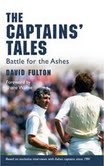The Captains’ Tale
Stuart Wark |Published: 2009
Pages: 272
Author: Fulton, David
Publisher: Mainstream Publishing
Rating: 3.5 stars

The majority of bestselling books that proudly boast the supposed authorship of a superstar cricketer on the cover are rarely written by the actual cricketer. Normally, a ghost writer is brought in to churn out the actual text which is based upon interviews. I find it is comforting to read books that are actually written by the nominated author. It is possible to believe that the words reflect the real thoughts of the writer, rather than being re-interpreted and probably sanitised by an intermediary. A number of former cricketers such as Mike Atherton, Geoff Lawson and Ed Smith have all personally written their own books, and the former English county player David Fulton has joined them with the release of his book, The Captains’ Tales. Fulton reviews and examines 17 recent Ashes Test captains from both England and Australia, considering their respective strengths and weaknesses as leaders.
Fulton’s credibility as a judge of these Ashes skippers is supported by his own career as both a fine first class batsman and as Kent captain. Interestingly, he reveals in the book that he was actually picked to make his Test debut against Australia in 4th Test of the 2001 Ashes at Headingly. However, the selectors back-flipped before publically announcing the side and re-instated Mark Butcher. While we may all criticise selectors at times, this decision was a masterstroke as Butcher played the innings of his life in winning the Test for England with 173 not out. Unfortunately for Fulton though, his name was never again pencilled in for an England side.
The profiles and analysis of the captains are based both upon Fulton’s experiences with the individuals during his time on the field, and also through interviews. There are some genuine moments of insight into the thought processes of great leaders, but just as interesting are the reflections of the captains that history does not remember well. The internal and external problems that faced Kim Hughes during the 1981 Ashes are fascinating to contemplate, and to then wonder how some of the other captains would have coped with that same situation.
There are, however, some frustrations with the book. The very first chapter on Mike Brearley didn’t start the book particularly well. It didn’t actually reveal anything more than could already be gleaned from Brearley’s own masterpiece The Art of Captaincy. In fact, this chapter quoted directly from Brearley’s works, and this approach was slightly off-putting. However, the remainder of the book improved, and did not appear to again suffer from this problem. The only other real issue is that at times the information that Fulton reveals is more accepted wisdom than anything really new and exciting. Nonetheless, there is still enough original content to keep the reader engaged to the end.
Fulton has done a good job in examining the role of captains in the recent Ashes battles. The importance of leadership is often overlooked in cricketing circles, and this book is one of the few that specifically focuses upon this issue. While it probably would not be considered essential reading for all cricket fans, particularly for supporters from countries other than Australia or England, The Captains’ Tales is still highly worth tracking down for anyone with an interest in captaincy.






Leave a comment